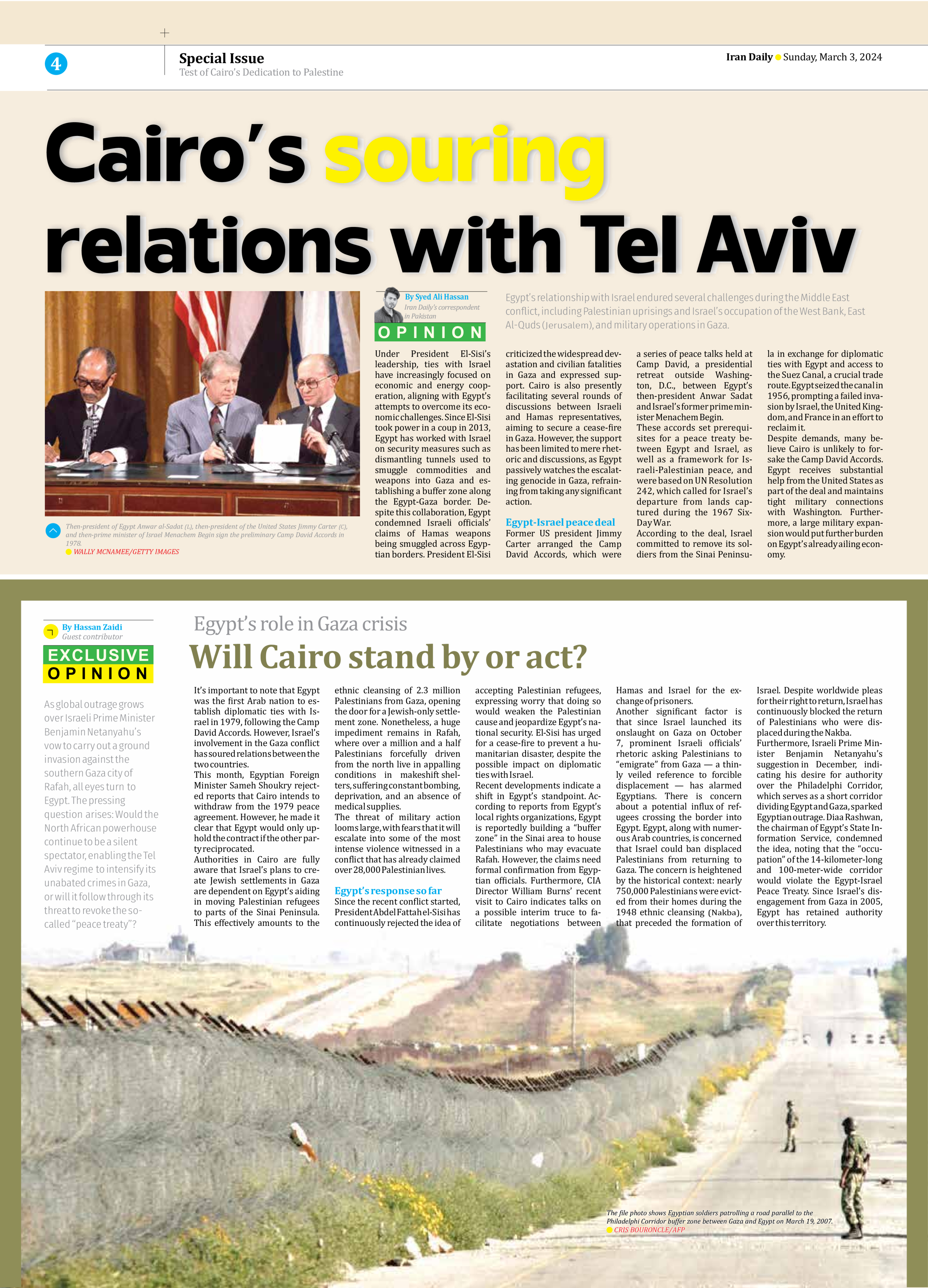
Egypt’s role in Gaza crisis
Will Cairo stand by or act?
By Hassan Zaidi
Guest contributor
As global outrage grows over Israeli Prime Minister Benjamin Netanyahu’s vow to carry out a ground invasion against the southern Gaza city of Rafah, all eyes turn to Egypt. The pressing question arises: Would the North African powerhouse continue to be a silent spectator, enabling the Tel Aviv regime to intensify its unabated crimes in Gaza, or will it follow through its threat to revoke the so-called “peace treaty”?
It’s important to note that Egypt was the first Arab nation to establish diplomatic ties with Israel in 1979, following the Camp David Accords. However, Israel’s involvement in the Gaza conflict has soured relations between the two countries.
This month, Egyptian Foreign Minister Sameh Shoukry rejected reports that Cairo intends to withdraw from the 1979 peace agreement. However, he made it clear that Egypt would only uphold the contract if the other party reciprocated.
Authorities in Cairo are fully aware that Israel’s plans to create Jewish settlements in Gaza are dependent on Egypt’s aiding in moving Palestinian refugees to parts of the Sinai Peninsula. This effectively amounts to the ethnic cleansing of 2.3 million Palestinians from Gaza, opening the door for a Jewish-only settlement zone. Nonetheless, a huge impediment remains in Rafah, where over a million and a half Palestinians forcefully driven from the north live in appalling conditions in makeshift shelters, suffering constant bombing, deprivation, and an absence of medical supplies.
The threat of military action looms large, with fears that it will escalate into some of the most intense violence witnessed in a conflict that has already claimed over 28,000 Palestinian lives.
Egypt’s response so far
Since the recent conflict started, President Abdel Fattah el-Sisi has continuously rejected the idea of accepting Palestinian refugees, expressing worry that doing so would weaken the Palestinian cause and jeopardize Egypt’s national security. El-Sisi has urged for a cease-fire to prevent a humanitarian disaster, despite the possible impact on diplomatic ties with Israel.
Recent developments indicate a shift in Egypt’s standpoint. According to reports from Egypt’s local rights organizations, Egypt is reportedly building a “buffer zone” in the Sinai area to house Palestinians who may evacuate Rafah. However, the claims need formal confirmation from Egyptian officials. Furthermore, CIA Director William Burns’ recent visit to Cairo indicates talks on a possible interim truce to facilitate negotiations between Hamas and Israel for the exchange of prisoners.
Another significant factor is that since Israel launched its onslaught on Gaza on October 7, prominent Israeli officials’ rhetoric asking Palestinians to “emigrate” from Gaza — a thinly veiled reference to forcible displacement — has alarmed Egyptians. There is concern about a potential influx of refugees crossing the border into Egypt. Egypt, along with numerous Arab countries, is concerned that Israel could ban displaced Palestinians from returning to Gaza. The concern is heightened by the historical context: nearly 750,000 Palestinians were evicted from their homes during the 1948 ethnic cleansing (Nakba), that preceded the formation of Israel. Despite worldwide pleas for their right to return, Israel has continuously blocked the return of Palestinians who were displaced during the Nakba.
Furthermore, Israeli Prime Minister Benjamin Netanyahu’s suggestion in December, indicating his desire for authority over the Philadelphi Corridor, which serves as a short corridor dividing Egypt and Gaza, sparked Egyptian outrage. Diaa Rashwan, the chairman of Egypt’s State Information Service, condemned the idea, noting that the “occupation” of the 14-kilometer-long and 100-meter-wide corridor would violate the Egypt-Israel Peace Treaty. Since Israel’s disengagement from Gaza in 2005, Egypt has retained authority over this territory.







